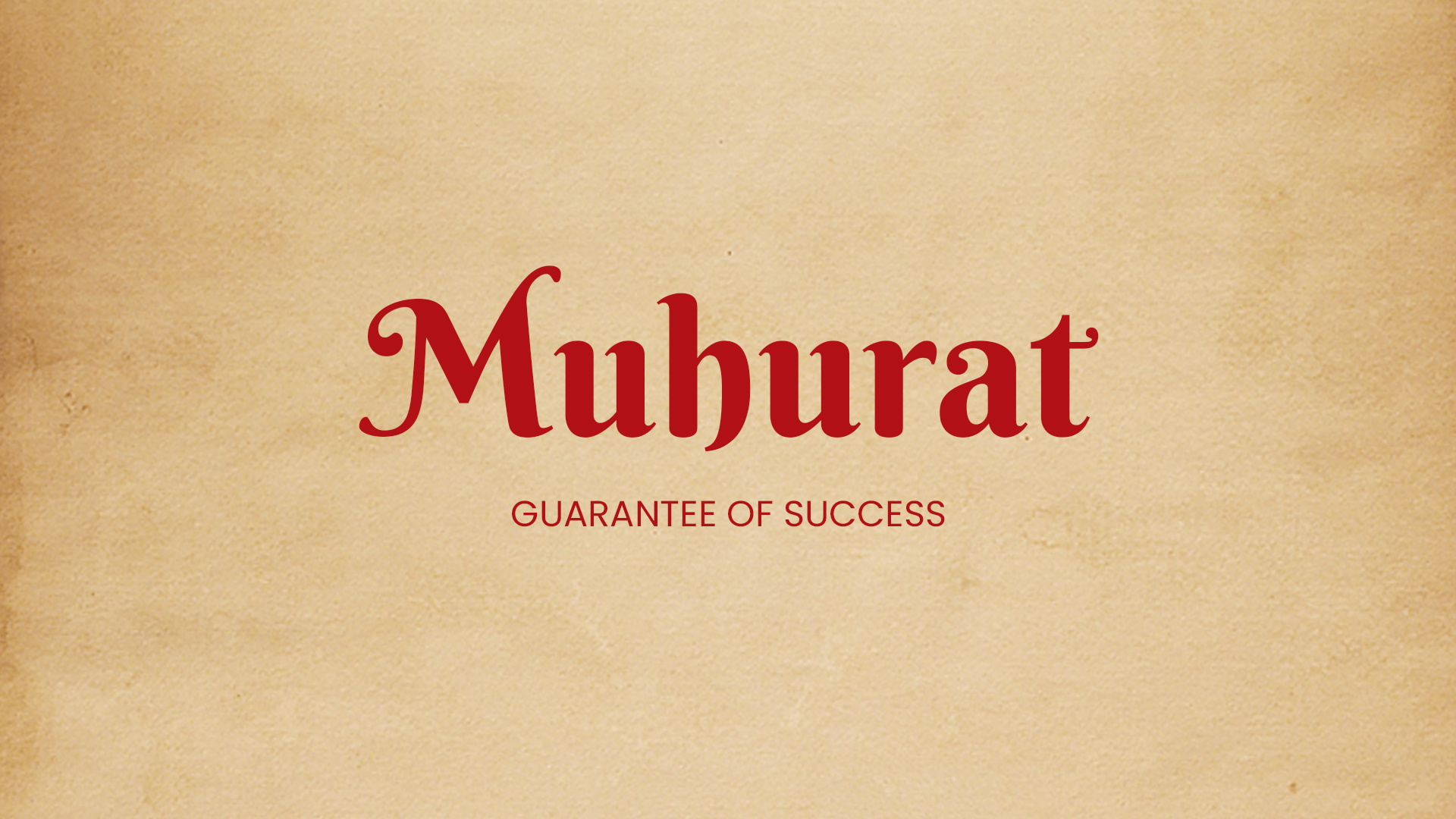In the realm of Hindu mythology, the concept of “Muhurat” holds great significance as a designated period considered most auspicious. This concept is deeply rooted in Indian tradition, particularly within the framework of Hinduism, where important and propitious activities are typically undertaken after the selection of an auspicious Muhurat. The determination of Muhurat is primarily based on the alignment of stars and planets, with the overarching goal of selecting a favorable time as dictated by celestial positioning for significant endeavors. It is believed that the success or failure of crucial undertakings is contingent upon the positions of the planets and stars. This notion prompts the inquiry: does Muhurat ensure success?
To explore whether Muhurat guarantees success, we can delve into ancient history for insight. The renowned Mahabharata War provides a compelling example. Before the outbreak of this monumental conflict, a series of pivotal events transpired. The war became an inexorable reality when Duryodhana adamantly rejected the Agyatvas and brazenly proclaimed his refusal to allocate even the minuscule amount of land equivalent to the tip of a needle to the Pandavas. It was during this noteworthy juncture that Sanjay conveyed the plea of the Pandavas and Lord Krishna as a messenger to the assembly in Virat Sabha on behalf of the Kauravas. Significantly, Yudhisthir issued a directive to Sanjay, delineating that their request be presented not only before Duryodhana but also in the presence of the entire assembly, including revered figures such as Bhisma Pitamah and Guru Dron. Sanjay diligently fulfilled this mandate, sequentially articulating the requests of each of the Pandavas before the entire Kauravas assembly. Specifically relaying Arjuna’s plea, Sanjay articulated that it was Duryodhana to whom Arjuna’s entreaty was directed. Recounting Arjuna’s words, Sanjay reiterated the shloka uttered by Arjuna:
उच्चावचं दैवयुक्तं रहस्यं दिव्या: प्रश्ना मृगचक्रा मुहूर्ता:।
क्षयं महान्तं कुरुसृज्जयानां निवेदयन्ते पाण्डवानां जयं च।।
– महाभारत
“Dharma is on our side, Shree Krishna is also with us, we also have a lot of Pundits and we also have an astrologer who possesses the knowledge of Trikala (Past, Present, and Future) and who also has the knowledge of Horoscopes, Chakras and Muhurat Shastra. All of them believe that in this war, the Pandavas will win and the Kauravas will lose. So my advice to you is that you should compromise.”
Upon hearing this discourse, Duryodhana cast a retrospective glance at Shakuni Mama, his eyes narrowing. Subsequently, both Duryodhana and Shakuni Mama sought out Maharshi Ved Vyas, beseeching him to discern the most auspicious moments (Muhurat) for the impending war, favoring the triumph of the Kauravas. Yielding to Duryodhana’s insistence, Ved Vyasji ascertained a Muhurat for the war that purportedly augured success for the Kauravas of Hastinapur. Despite this provision, Duryodhana remained plagued by insecurity, prompting him to seek counsel from Sahadeva. Venturing into the quandary of his uncertainty, Duryodhana solicited Sahadeva’s opinion regarding the Muhurat prescribed by Ved Vyasji, one that purportedly guaranteed victory for the Kauravas of Hastinapur. In response, Sahadev affirmed the veracity of the calculations and Muhurat, asserting that if the war were to transpire during the designated time delineated by Ved Vyasji, the Kauravas of Hastinapur would indubitably emerge triumphant.
Subsequently, the day and time of the war were definitively established. However, Duryodhana’s profound insecurity persisted, driven by the recollection of Ved Vyasji’s assertion that the triumph of the Kauravas was contingent upon the war commencing at the specifically designated Muhurat. This pervasive sense of unease led Duryodhana to dispatch one of his messengers, Uluk, to the Pandavas on the eve of the impending battle. Assuming the role of Duryodhana’s emissary, Uluk engaged the Pandavas in a confrontational and disdainful manner, directing offensive remarks at Draupadi, Lord Krishna, and the Pandavas, while urging them not to cower and flee from the impending conflict, in a veiled allusion to Lord Krishna’s perceived nature of retreat. Instead, he goaded them to honor the predetermined time for the commencement of the war. In response to this provocation, Arjuna, incensed by Uluk’s effrontery, pledged to initiate the war at the first break of dawn, vehemently asserting his resolve. This declaration by Arjuna encapsulates the intensity of the exchange that transpired:
तथेत्वाह अर्जुन: सव्यसाची निशाव्यपाये भविता विमर्द:।
– महाभारत
After much anticipation, two pivotal events occurred during the time of war that dramatically altered the course of the Mahabharata. As tradition dictates, both armies assembled to face one another before the commencement of battle. Similarly, in the Mahabharata, two opposing armies stood poised for conflict. Each side presented their most formidable warriors and sounded the war cry to initiate the clash. However, in a critical moment, whether by divine will or fateful inevitability, Arjun was overcome with melancholy. It was then that Arjun confided in Shree Krishna, expressing his reluctance to engage in combat, citing a lack of discernible gains from the war. He implored Shree Krishna to position his chariot between the two armies. This poignant exchange is immortalized in a verse from the Shrimad Bhagavad Gita:
सेनयोरुभयोर्मध्ये रथं स्थापय मेऽच्युत।
– श्रीमद् भगवद् गीता
We all know that to pacify the occurrence of uncertainty in Arjuna’s mind, Shree Krishna preached 700 verses of Bhagavad Gita in front of Arjun. And it consumed a lot of time. In the 18th Adhyay of Shrimad Bhagavad Gita, Shree Krishna has said a verse which states :
करिष्ये वचनं तव।
– श्रीमद् भगवद् गीता
And so, the Bhagavad Gita culminates with Arjun’s pledge, in the 18th Adhyay, to heed Shree Krishna’s divine guidance. Once more, both armies stood poised for conflict. Despite the passage of significant time, the auspicious moment for victory (Vijay Muhurat) for the Kauravas persisted. Then, in a remarkable turn of events, as if ordained by the Universe or by the will of Shree Krishna, a profound occurrence transpired. Just as the war was on the brink of commencement, Yudhisthir unfastened his armor, relinquished his weaponry, and placed them in the chariot. He then descended from the chariot, clasped his hands together, and advanced towards the army of the Kauravas. A verse capturing this momentous event is presented below:
विमुच्य कवचं वीरो निक्षिप्य च वरायुधम्।
अवरुह्य रथात्तूर्णं पद्भ्यामेव कृताञ्जलि:।।
– महाभारत
Upon witnessing this sight, many of the Kauravas erupted into laughter, presuming that Yudhisthir had lost his resolve and was approaching them to seek reconciliation and halt the impending war. Even the other Pandavas began to harbor doubts, as explicitly noted in the Mahabharata, with all of them urging Yudhisthir not to proceed, knowing that the war was unavoidable. Dhrupad and the other commanders of the army also endeavored to dissuade Yudhisthir, except for Shree Krishna. With a knowing smile, Shree Krishna remarked, “I understand Yudhisthir’s intent and his course of action, so let him carry it out.” This pronouncement of Shree Krishna is immortalized in the Mahabharata in the form of a verse.
अभिप्रायोऽस्य विज्ञातो मयेति प्रहसन्निव।
– महाभारत
Arriving at the Kauravas’ side, Yudhisthir sought the blessings of Bhisma Pitamah, Guru Dron, Krupacharya, Shlav, and other esteemed elders. This ritual consumed a considerable amount of time, and as Yudhisthir completed the process of receiving blessings from all the elders, the fateful Vijay Muhurat, or auspicious time for victory, had lapsed. In this context, it should be noted that one Muhurat equates to two Ghadi or 48 minutes. The occurrence of these two pivotal events at the outset of the war led to the expiration of the 48 minutes of the Vijay Muhurat. Rushi Jemini has also posited that in the war of the Mahabharata, the victory of the Pandavas was not solely due to Lord Krishna and righteousness (Dharma). The postponement of the Vijay Muhurat of the Kauravas also played a significant role. Hence, the importance of Muhurat in the success of significant or auspicious undertakings cannot be understated. While some experts maintain that the Pandavas triumphed solely due to Dharma and the influence of Shree Krishna, others believe that the Muhurat also contributed to their victory. If any doubts persist regarding the relevance of Muhurat and its impact on the triumph of the Pandavas, I would like to share another account elucidating the significance of Muhurat in assuring success.
In the ‘Bruhad Samhita’, a tale is recounted wherein the deities, representing the forces of positivity and constructive energy, were vanquished in a battle against the demons. This conflict transpired before the Manvantra, and as per the prevailing beliefs, the deities embody the positive, balanced forces that work for the betterment of the universe, while the demons represent destructive tendencies detrimental to the universe. In the course of this war, Indra, the king of the deities, became apprehensive as he perceived the deities’ impending defeat. Seeking counsel, Indra approached the advisor of the deities, Bruhaspati, to discern the underlying cause of their defeat, given their commitment to the advancement of the world. In response, Bruhaspati made a calculation and inquired of Indra, “Did you consider the Muhurat before engaging in the conflict?” Indra conceded that they had not considered the Muhurat for the war. Regrettably, Bruhaspati expressed his conviction that the defeat of the deities was inevitable. Challenged by Indra regarding the prospect of losing due to the omission of a single Muhurat, considering their endeavor to uphold the world’s equilibrium and work for its welfare, Bruhaspati maintained, “Yes, because the fate of this entire planet is contingent upon the positioning of the planets.” Bruhaspati also imparted a renowned verse that astrologers often cite. The verse given is :
ग्रहाधीनं जगत् सर्वं ग्रहाधीना: नरावरा:।
कालज्ञानं ग्रहाधीनं ग्रहा: कर्मफलप्रदा:।।
– बृहस्पति संहिता
“The entire world is dependent on the planets and all the good people are also dependent on the planets. Even the knowledge of Kal Tatva (Time element) is also dependent upon the planets. And only planets are responsible for the results of karma.”
These historical events from ancient times serve to underscore a crucial point: the significance of time surpasses and outweighs one’s intentions, identity—be it godly or demonic—and even one’s faction, whether aligned with Dharma or Adharma. Many scriptures, including the Bruhaspati Samhita, Atri Samhita, Vashisth Samhita, and others, delineate the concept of five components of time: Varsh (Year), Month, Day, Lagna, and Muhurat. Their potency escalates following this sequence, with a Month holding more influence than a Year, a Day prevailing over a Month, a Lagna superseding a Day, and a Muhurat commanding authority over a Lagna. The scriptures explicitly state that the deficiencies within a year can be rectified by an auspicious month; thus, if an entire year proves unfavorable, the virtues of a single auspicious month can offset the year’s shortcomings. In a similar vein, the blemishes of a month can be absolved by an auspicious day, while the imperfections of a day can be nullified by a propitious Lagna, representing two hours. Therefore, even if an entire day is tainted, the presence of a favorable Lagna can ameliorate its quality. Subsequently, a propitious Muhurat, encompassing 48 minutes within that Lagna period, can purge the deficiencies of the entire Lagna. It is therefore imperative to consult the Muhurat before undertaking any endeavor, as expounded in the ancient Samhitas.
A verse stating the same is given in Samhita Granth :
वर्ष मासो दिनं लग्नं मुहूर्तश्चेति पञ्चकम्।
कालस्य अङ्गानि मुख्यानि प्रबलानि उत्तरोत्तरम्।।
मासोवर्षभवंहन्ति मासभवंदिनं लग्नंदिनभवं हन्ति
मुहूर्त: सर्व दूषणम्।
तस्मात् शुद्धि मुहूर्तस्य सर्व कार्येषु उच्यते।।
– बृहस्पति संहिता, गौतम संहिता, संहिता ग्रन्थ्
In our scriptures, a comprehensive explanation is provided regarding the ideal timing for specific undertakings. Specific time frames are designated for various activities, such as the first feeding of a baby, enrolling in school or college, taking exams, embarking on one’s first job, or submitting a business proposal. Muhurat is also prescribed for entering a new Vastu, be it a home, or for purchasing or booking a new vehicle. There are designated Muhurats for traveling and getting married, and even for potentially destructive actions like engaging in warfare or conflict. It may come as a surprise that scriptures even provide a Muhurat for activities like looting and theft. Moreover, Muhurat is specified for our daily routine activities and other pursuits. Hence, there exists a comprehensive discourse on how to calculate Muhurat for all types of endeavors. Muhurat Shastra itself constitutes a deeply thorough and comprehensive subject. From the aforementioned ancient stories, it becomes evident that Muhurat is a guarantee of success for any undertaking. Muhurat Darshan presents a verse emphasizing the importance of determining an auspicious Muhurat for any significant work. The verse given is:
काल: शुभ क्रियायोग्यो मुहूर्त इति कथ्यते।
– मुहूर्तदर्शन
Among all the scriptures, none offers a guaranteed assurance of success except for Muhurat. This aspect underscores the distinctiveness of Muhurat Shastra. To ensure obtaining the appropriate Muhurat for any endeavor, seeking the guidance of an expert or someone well-versed in the scriptures is recommended. Therefore, it is advisable to calculate the Muhurat before undertaking or commencing any new undertaking.
Shubham Bhavatu.








